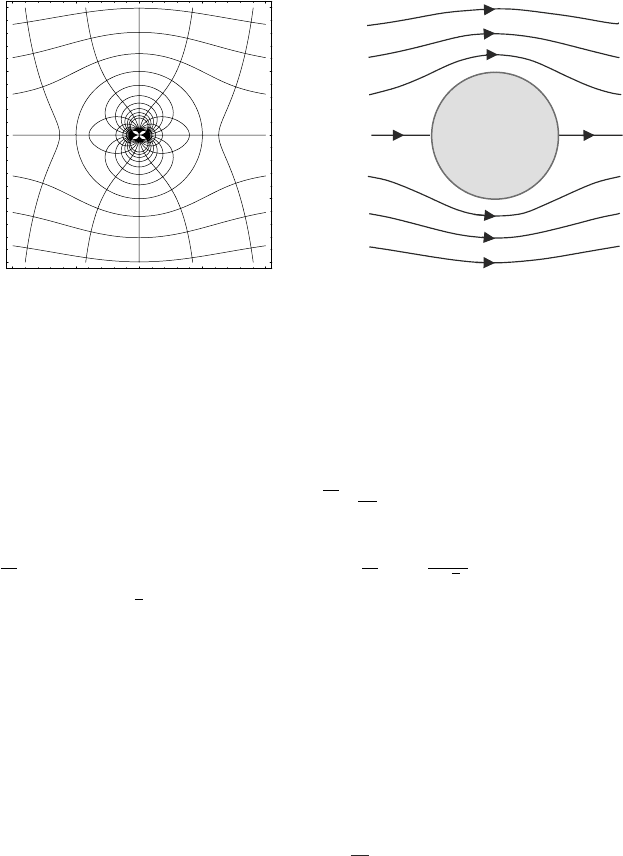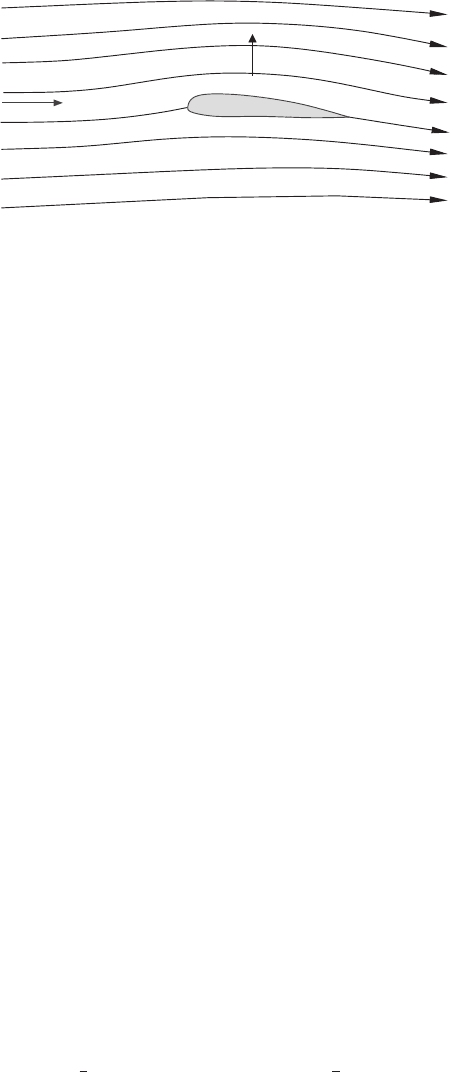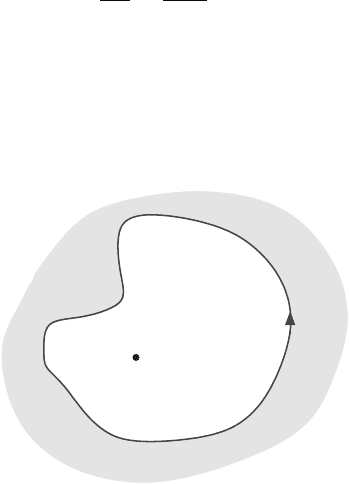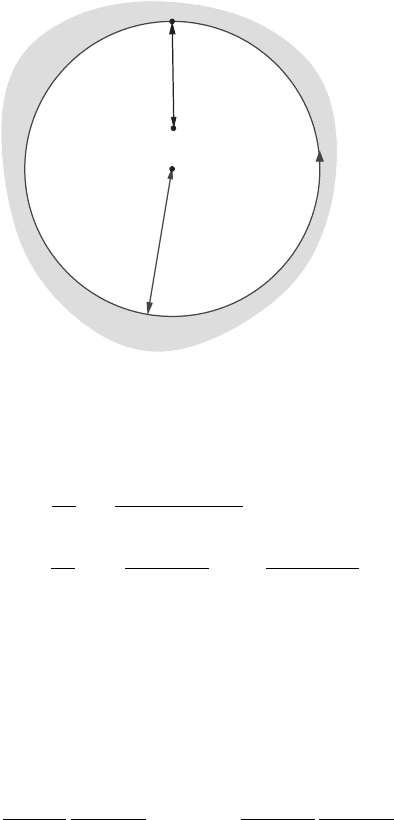Stone M., Goldbart P. Mathematics for Physics: A Guided Tour for Graduate Students
Подождите немного. Документ загружается.


17.3 Applications 625
To understand the source of the non-commutativity, take real and imaginary parts of
these last two equations. Write ln z = ln |z|+iθ , where θ = arg z, and add and subtract.
We find
∇
2
ln |z|=2πδ
2
(x, y),
(∂
x
∂
y
− ∂
y
∂
x
)θ = 2πδ
2
(x, y). (17.72)
The first of these shows that
1
2π
ln |z| is the Green function for the Laplace operator, and
the second reveals that the vector field ∇θ is singular, having a delta function “curl” at
the origin.
If we have a vector field v with contravariant components (v
x
, v
y
) and (numerically
equal) covariant components (v
x
, v
y
) then the covariant components in the complex
coordinate system are v
z
=
1
2
(v
x
− iv
y
) and v
z
=
1
2
(v
x
+ iv
y
). This can be obtained by
using the change of coordinates rule, but a quicker route is to observe that
v · dr = v
x
dx + v
y
dy = v
z
dz + v
z
dz. (17.73)
Now
∂
z
v
z
=
1
4
(∂
x
v
x
+ ∂
y
v
y
) + i
1
4
(∂
y
v
x
− ∂
x
v
y
). (17.74)
Thus the statement that ∂
z
v
z
= 0 is equivalent to the vector field v being both solenoidal
(incompressible) and irrotational. This can also be expressed in form language by setting
η = v
z
dz and saying that dη = 0 means that the corresponding vector field is both
solenoidal and irrotational.
17.3.2 Milne–Thomson circle theorem
As we mentioned earlier, we can describe an irrotational and incompressible fluid motion
either by a velocity potential
v
x
= ∂
x
φ, v
y
= ∂
y
φ, (17.75)
where v is automatically irrotational but incompressibility requires ∇
2
φ = 0, or by a
stream function
v
x
= ∂
y
χ, v
y
=−∂
x
χ, (17.76)
where v is automatically incompressible but irrotationality requires ∇
2
χ = 0. We can
combine these into a single complex stream function = φ+iχ which, for an irrotational
incompressible flow, satisfies the Cauchy–Riemann equations and is therefore an analytic
function of z. We see that
2v
z
=
d
dz
, (17.77)

626 17 Complex analysis
–2 –1 0 1 2
–2
–1
0
1
2
Figure 17.7 The real and imaginary parts of the function z +z
−1
provide the velocity potentials
and streamlines for irrotational incompressible flow past a cylinder of unit radius.
φ and χ making equal contributions.
The Milne–Thomson theorem says that if is the complex stream function for a flow
in unobstructed space, then
;
= (z) +
a
2
z
(17.78)
is the stream function after the cylindrical obstacle |z|=a is inserted into the flow.
Here
(z) denotes the analytic function defined by
(z) = (z). To see that this works,
observe that a
2
/z = z on the curve |z|=a, and so on this curve Im
;
= χ = 0.
The surface of the cylinder has therefore become a streamline, and so the flow does not
penetrate into the cylinder. If the original flow is created by sources and sinks exterior
to |z|=a, which will be singularities of , the additional term has singularities that lie
only within |z|=a. These will be the “images” of the sources and sinks in the sense of
the “method of images”.
Example: A uniform flow with speed U in the x-direction has (z) = Uz. Inserting a
cylinder makes this (see Figure 17.7)
˜
(z) = U
z +
a
2
z
. (17.79)
Because v
z
is the derivative of this, we see that the perturbing effect of the obstacle on
the velocity field falls off as the square of the distance from the cylinder. This is a general
result for obstructed flows.
17.3.3 Blasius and Kutta–Joukowski theorems
We now derive the celebrated result, discovered independently by Martin Wilhelm Kutta
(1902) and Nikolai Egorovich Joukowski (1906), that the lift per unit span of an aircraft

17.3 Applications 627
U
F
Figure 17.8 Flow past an aerofoil.
wing is equal to the product of the density of the air ρ, the circulation κ ≡
E
v · dr
about the wing and the forward velocity U of the wing through the air (Figure 17.8).
Their theory treats the air as being incompressible – a good approximation unless the
flow-velocities approach the speed of sound – and assumes that the wing is long enough
that the flow can be regarded as being two dimensional.
Begin by recalling how the momentum flux tensor
T
ij
= ρv
i
v
j
+ g
ij
P (17.80)
enters fluid mechanics. In cartesian coordinates, and in the presence of an external body
force f
i
acting on the fluid, the Euler equation of motion for the fluid is
ρ(∂
t
v
i
+ v
j
∂
j
v
i
) =−∂
i
P +f
i
. (17.81)
Here P is the pressure and we are distinguishing between co- and contravariant compo-
nents, although at the moment g
ij
≡ δ
ij
. We can combine Euler’s equation with the law
of mass conservation,
∂
t
ρ + ∂
i
(ρv
i
) = 0, (17.82)
to obtain
∂
t
(ρv
i
) + ∂
j
(ρv
j
v
i
+ g
ij
P) = f
i
. (17.83)
This momemtum-tracking equation shows that the external force acts as a source of
momentum, and that for steady flow f
i
is equal to the divergence of the momentum flux
tensor:
f
i
= ∂
l
T
li
= g
kl
∂
k
T
li
. (17.84)
As we are interested in steady, irrotational motion with uniform density we may use
Bernoulli’s theorem, P +
1
2
ρ|v|
2
= const., to substitute −
1
2
ρ|v|
2
in place of P. (The con-
stant will not affect the momentum flux.) With this substitution T
ij
becomes a traceless

628 17 Complex analysis
symmetric tensor:
T
ij
= ρ(v
i
v
j
−
1
2
g
ij
|v|
2
). (17.85)
Using v
z
=
1
2
(v
x
− iv
y
) and
T
zz
=
∂x
i
∂z
∂x
j
∂z
T
ij
, (17.86)
together with
x ≡ x
1
=
1
2
(z +
z), y ≡ x
2
=
1
2i
(z −
z) (17.87)
we find
T ≡ T
zz
=
1
4
(T
xx
− T
yy
− 2iT
xy
) = ρ(v
z
)
2
. (17.88)
This is the only component of T
ij
that we will need to consider. T
zz
is simply T , whereas
T
zz
= 0 = T
zz
because T
ij
is traceless.
In our complex coordinates, the equation
f
i
= g
kl
∂
k
T
li
(17.89)
reads
f
z
= g
zz
∂
z
T
zz
+ g
zz
∂
z
T
zz
= 2∂
z
T . (17.90)
We see that in steady flow the net momentum flux
˙
P
i
out of a region is given by
˙
P
z
=
f
z
dxdy =
1
2i
f
z
dzdz =
1
i
∂
z
Tdzdz =
1
i
F
∂
Tdz. (17.91)
We have used Stokes’theorem at the last step. In regions where there is no external force,
T is analytic, ∂
z
T = 0, and the integral will be independent of the choice of contour ∂.
We can subsititute T = ρv
2
z
to get
˙
P
z
=−iρ
F
∂
v
2
z
dz. (17.92)
To apply this result to our aerofoil we can take ∂ to be its boundary. Then
˙
P
z
is the
total force exerted on the fluid by the wing, and, by Newton’s third law, this is minus
the force exerted by the fluid on the wing. The total force on the aerofoil is therefore
F
z
= iρ
F
∂
v
2
z
dz. (17.93)
The result (17.93) is often called Blasius’ theorem.

17.3 Applications 629
Evaluating the integral in (17.93) is not immediately possible because the velocity
v on the boundary will be a complicated function of the shape of the body. We can,
however, exploit the contour independence of the integral and evaluate it over a path
encircling the aerofoil at large distance where the flow field takes the asymptotic form
v
z
= U
z
+
κ
4πi
1
z
+ O
1
z
2
. (17.94)
The O(1/z
2
) term is the velocity perturbation due to the air having to flow round the wing,
as with the cylinder in a free flow. To confirm that this flow has the correct circulation
we compute
F
v · dr =
F
v
z
dz +
F
v
z
dz = κ. (17.95)
Substituting v
z
in (17.93) we find that the O(1/z
2
) term cannot contribute as it cannot
affect the residue of any pole. The only part that does contribute is the cross-term that
arises from multiplying U
z
by κ/(4π iz). This gives
F
z
= iρ
U
z
κ
2πi
F
dz
z
= iρκU
z
(17.96)
so that
1
2
(F
x
− iF
y
) = iρκ
1
2
(U
x
− iU
y
). (17.97)
Thus, in conventional coordinates, the reaction force on the body is
F
x
= ρκU
y
,
F
y
=−ρκU
x
. (17.98)
The fluid therefore provides a lift force proportional to the product of the circulation
with the asymptotic velocity. The force is at right angles to the incident airstream, so
there is no drag.
The circulation around the wing is determined by the Kutta condition that the velocity
of the flow at the sharp trailing edge of the wing be finite. If the wing starts moving
into the air and the requisite circulation is not yet established then the flow under the
wing does not leave the trailing edge smoothly but tries to whip round to the topside.
The velocity gradients become very large and viscous forces become important and
prevent the air from making the sharp turn. Instead, a starting vortex is shed from the
trailing edge. Kelvin’s theorem on the conservation of vorticity shows that this causes a
circulation of equal and opposite strength to be induced about the wing.

630 17 Complex analysis
For finite wings, the path independence of
E
v ·dr means that the wings must leave a
pair of trailing wingtip vortices of strength κ that connect back to the starting vortex to
form a closed loop. The velocity field induced by the trailing vortices causes the airstream
incident on the aerofoil to come from a slightly different direction than the asymptotic
flow. Consequently, the lift is not quite perpendicular to the motion of the wing. For
finite-length wings, therefore, lift comes at the expense of an inevitable induced drag
force. The work that has to be done against this drag force in driving the wing forwards
provides the kinetic energy in the trailing vortices.
17.4 Applications of Cauchy’s theorem
Cauchy’s theorem provides the Royal Road to complex analysis. It is possible to develop
the theory without it, but the path is harder going.
17.4.1 Cauchy’s integral formula
If f (z) is analytic within and on the boundary of a simply connected domain , with
∂ = , and if ζ is a point in , then, noting that the integrand has a simple pole at
z = ζ and applying the residue formula, we have Cauchy’s integral formula
f (ζ ) =
1
2πi
F
f (z )
z − ζ
dz, ζ ∈ . (17.99)
This formula holds only if ζ lies within (Figure 17.9). If it lies outside, then the
integrand is analytic everywhere inside , and so the integral gives zero.
Figure 17.9 Cauchy contour.

17.4 Applications of Cauchy’s theorem 631
We may show that it is legitimate to differentiate under the integral sign in Cauchy’s
formula. If we do so n times, we have the useful corollary that
f
(n)
(ζ ) =
n!
2πi
F
f (z )
(z − ζ)
n+1
dz. (17.100)
This shows that being once differentiable (analytic) in a region automatically implies
that f (z) is differentiable arbitrarily many times!
Exercise 17.6: The generalized Cauchy formula. Suppose that we have solved a D-bar
problem (see Exercise 17.3), and so found an F(z,
z) with ∂
z
F = f (z, z) in a region .
Compute the exterior derivative of
F(z,
z)
z − ζ
using (17.56). Now, manipulating formally with delta functions, apply Stokes’ theorem
to show that, for (ζ,
¯
ζ) in the interior of , we have
F(ζ ,
¯
ζ) =
1
2πi
F
∂
F(z, z)
z − ζ
dz −
1
π
f (z , z)
z − ζ
dx dy.
This is called the generalized Cauchy formula. Note that the first term on the right, unlike
the second, is a function only of ζ , and so is analytic.
Liouville’s theorem
A dramatic corollary of Cauchy’s integral formula is provided by
Liouville’s theorem: If f (z) is analytic in all of C, and is bounded there, meaning that
there is a positive real number K such that |f (z)| < K , then f (z) is a constant.
This result provides a powerful strategy for proving that two formulæ, f
1
(z) and f
2
(z),
represent the same analytic function. If we can show that the difference f
1
−f
2
is analytic
and tends to zero at infinity then Liouville’s theorem tells us that f
1
= f
2
.
Because the result is perhaps unintuitive, and because the methods are typical, we
will spell out in detail how Liouville’s theorem works. We select any two points, z
1
and
z
2
, and use Cauchy’s formula to write
f (z
1
) − f (z
2
) =
1
2πi
F
1
z − z
1
−
1
z − z
2
f (z ) dz. (17.101)
We take the contour to be a circle of radius ρ centred on z
1
(Figure 17.10). We make
ρ>2|z
1
− z
2
|, so that when z is on we are sure that |z − z
2
| >ρ/2. Then, using

632 17 Complex analysis
> /2
z
2
z
1
z
Figure 17.10 Contour for Liouville’s theorem.
|
f (z )dz|≤
|f (z )||dz|, we have
|f (z
1
) − f (z
2
)|=
1
2π
!
!
!
!
F
(z
1
− z
2
)
(z − z
1
)(z − z
2
)
f (z ) dz
!
!
!
!
≤
1
2π
2π
0
|z
1
− z
2
|K
ρ/2
dθ =
2|z
1
− z
2
|K
ρ
. (17.102)
The right-hand side can be made arbitrarily small by taking ρ large enough, so we must
have f (z
1
) = f (z
2
).Asz
1
and z
2
were any pair of points, we deduce that f (z) takes the
same value everywhere.
Exercise 17.7: Let a
1
, ..., a
N
be N distinct complex numbers. Use Liouville’s theorem
to prove that
k=j
N
j=1
1
(z − a
j
)
1
(z − a
k
)
2
=
k=j
N
j=1
1
(a
k
− a
j
)
1
(z − a
k
)
2
.
17.4.2 Taylor and Laurent series
We have defined a function to be analytic in a domain D if it is (once) complex differen-
tiable at all points in D. It turned out that this apparently mild requirement automatically
implied that the function is differentiable arbitrarily many times in D. In this section we
shall see that knowledge of all derivatives of f (z) at any single point in D is enough to
completely determine the function at any other point in D. Compare this with functions
of a real variable, for which it is easy to construct examples that are once but not twice
differentiable, and where complete knowledge of function at a point, or in even in a

17.4 Applications of Cauchy’s theorem 633
neighbourhood of a point, tells us absolutely nothing of the behaviour of the function
away from the point or neighbourhood.
The key ingredient in these almost magical properties of complex analytic functions
is that any analytic function has a Taylor series expansion that actually converges to
the function. Indeed an alternative definition of analyticity is that f (z) be representable
by a convergent power series. For real variables this is the definition of a real analytic
function.
To appreciate the utility of power series representations we do need to discuss some
basic properties of power series. Most of these results are extensions to the complex
plane of what we hope are familiar notions from real analysis.
Consider the power series
∞
n=0
a
n
(z − z
0
)
n
≡ lim
N →∞
S
N
, (17.103)
where S
N
are the partial sums
S
N
=
N
n=0
a
n
(z − z
0
)
n
. (17.104)
Suppose that this limit exists (i.e. the series is convergent) for some z = ζ ; then it turns
out that the series is absolutely convergent
5
for any |z − z
0
| < |ζ −z
0
|.
To establish this absolute convergence we may assume, without loss of generality,
that z
0
= 0. Then, convergence of the sum
,
a
n
ζ
n
requires that |a
n
ζ
n
|→0, and thus
|a
n
ζ
n
| is bounded. In other words, there is a B such that |a
n
ζ
n
| < B for any n. We now
write
|a
n
z
n
|=|a
n
ζ
n
|
!
!
!
!
z
ζ
!
!
!
!
n
< B
!
!
!
!
z
ζ
!
!
!
!
n
. (17.105)
The sum
,
|a
n
z
n
| therefore converges for |z/ζ | < 1, by comparison with a geometric
progression.
This result, that if a power series in (z − z
0
) converges at a point then it converges at
all points closer to z
0
, shows that a power series possesses some radius of convergence
R. The series converges for all |z − z
0
| < R, and diverges for all |z − z
0
| > R. What
happens on the circle |z − z
0
|=R is usually delicate, and harder to establish. A useful
result, however, is Abel’s theorem, which we will not try to prove. Abel’s theorem says
5
Recall that absolute convergence of
,
a
n
means that
,
|a
n
| converges. Absolute convergence implies
convergence, and also allows us to rearrange the order of terms in the series without changing the value of
the sum. Compare this with conditional convergence, where
,
a
n
converges, but
,
|a
n
|does not. You may
remember that Riemann showed that the terms of a conditionally convergent series can be rearranged so as
to get any answer whatsoever!

634 17 Complex analysis
that if the sum
,
a
n
is convergent, and if A(z) =
,
∞
n=0
a
n
z
n
for |z| < 1, then
lim
z→1
−
A(z) =
∞
n=0
a
n
. (17.106)
The converse is not true: if A(z) has a finite limit as we approach the circle of convergence,
the corresponding sum need not converge
By comparison with a geometric progression, we may establish the following useful
formulæ giving R for the series
,
a
n
z
n
:
R = lim
n→∞
|a
n−1
|
|a
n
|
= lim
n→∞
|a
n
|
1/n
. (17.107)
The proof of these formulæ is identical to the real-variable version.
We soon show that the radius of convergence of a power series is the distance from
z
0
to the nearest singularity of the function that it represents.
When we differentiate the terms in a power series, and thus take a
n
z
n
→ na
n
z
n−1
, this
does not alter R. This observation suggests that it is legitimate to evaluate the derivative
of the function represented by the power series by differentiating term-by-term. As a
step on the way to justifying this, observe that if the series converges at z = ζ and D
r
is the domain |z| < r < |ζ | then, using the same bound as in the proof of absolute
convergence, we have
|a
n
z
n
| < B
|z
n
|
|ζ |
n
< B
r
n
|ζ |
n
= M
n
(17.108)
where
,
M
n
is convergent. As a consequence
,
a
n
z
n
is uniformly convergent in D
r
by the Weierstrass “M ” test. You probably know that uniform convergence allows us
to interchange the order of sums and integrals:
(
,
f
n
(x))dx =
,
f
n
(x)dx. For real
variables, uniform convergence is not a strong enough condition for us to safely inter-
change order of sums and derivatives: (
,
f
n
(x))
is not necessarily equal to
,
f
n
(x). For
complex analytic functions, however, Cauchy’s integral formula reduces the operation
of differentiation to that of integration, and so this interchange is permitted. In particular
we have that if
f (z ) =
∞
n=0
a
n
z
n
, (17.109)
and R is defined by R =|ζ |for any ζ for which the series converges, then f (z) is analytic
in |z| < R and
f
(z) =
∞
n=0
na
n
z
n−1
, (17.110)
is also analytic in |z| < R.
